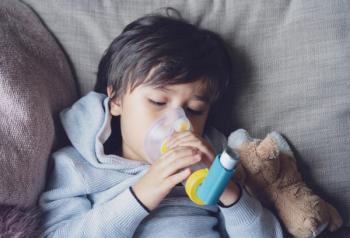
Behavior: Ask the experts
BEHAVIOR:
ASK THE EXPERTS
2-YEAR-OLD CALLS HER MOTHER "BITCH"
Q A 2-year-old girl in my practice calls her mother "bitch." The mother, who is going through a divorce, is embarrassed when her daughter does this in publicat the mall, for example. Mom believes that the girl's father and his parents have taught the child this name. The nurses at the hospital where I admitted the child for pneumonia reported that the girl interacts well with her mother, but that she uses the word when she gets angry.
I have asked Mom to ignore the girl's behavior so as not to reinforce it. She has also tried time-out, without success. I suggested that the mother consult her husband on this matter, but he is uncooperative. What else can I recommend?
Syed Rizvi
Harlingen, Tex.
A The behavioral interventions you have recommended have put Mom on the right track. A 2-year-old cannot understand what "bitch" means or why the word is "bad," but she will clearly see the reaction it produces. Therefore, the mother's reaction (and possibly the reaction of others) to this emotionally charged word must be reinforcing the behavior, which increases the likelihood that the child will use the word again when she is upset with her mother.
Placing the child in time out or ignoring the word should decrease the behavior. The question in this case is why these interventions have been unsuccessful. It is quite likely that several factors account for why ignoring the behavior is not working:
- The mother may have given up too quickly on ignoring the behavior. Initially, this intervention may cause the child to say the word more frequently or more loudly. Only after the child repeatedly experiences her mother's failure to respond to this word will the behavior begin to decrease.
- Being inconsistent in ignoring the behavior, and hence intermittently reinforcing it, may be making the intervention ineffective. In fact, intermittent reinforcement is an extremely effective way to ensure that the behavior does not go away.
- Mom may not have an alternate plan for dealing with this behavior in public, when it is extremely difficult to ignore. For example, in going to the mall, I suggest keeping trips short, so the child is not likely to get bored, sleepy, or hungry during the trip, and planning something that is fun for the child as a reward for good behavior. In addition, the mother should take her daughter to the mall only if she is willing to leave if the child acts up. A psychologist may be able to help Mom develop plans for these situations.
It may be helpful to talk with Mom about what the child is really communicating when she calls her mother a "bitch." Essentially, all she is saying is "Mommy, I am angry at you." It may be difficult for a parent who is going through a divorce to tolerate her child's anger at her, but she cannot avoid it if she is to parent a 2-year-old appropriately. You may help Mom tolerate expressions of anger during this difficult time by emphasizing that she would do more harm than good by averting her child's displeasure. It also may be useful to point out to Mom that her 2-year-old is unable to understand why "bitch" causes such a negative reaction.
I would discuss with the mother her belief that the name-calling is something the father taught the child to do. In the context of a divorce, this belief may make it harder to ignore the behavior because it is likely that the mother views it as something else the child's father is doing to hurt her. The child may say the word, but it is Dad whom Mom hears. This situation suggests that mother and father may be fighting battles through their child, one of the major factors associated with poor child adjustment after a divorce. I would consider talking to both parents about the need to resolve their differences away from the child.
Last, do not minimize your role as a support person for this child's mother. In the context of a failed marriage, it would not be unusual for parents to have doubts about their competence in other roles, such as parenting. Reassuring and complimenting Mom on her parenting skills may go a long way toward helping her adjust to her new situation.
Nathan J. Blum, MD
Philadelphia, Pa.
DR. BLUM is Assistant Professor of Pediatrics, University of Pennsylvania School of Medicine and Children's Seashore House of Children's Hospital of Philadelphia.
10-YEAR-OLD PULLS OUT HAIR
Q I could use help managing a 10-year-old girl who pulls out her hair.
Joseph Curi, MD
Torrington, Conn.
A Hair pulling can cause a significant cosmetic problem that often reflects a serious mental health disorder. First, be sure that the hair and scalp are normal and that hair loss is not a result of tinea, alopecia areata, or another medical condition. Some children with ADHD begin picking at their skin or clothes and pulling their hair as a dose-related side effect of stimulant medication, especially dextroamphetamine.
The mild form of hair pulling, in which hair loss is insignificant, often begins in infancy as part of self-soothing behavior, such as thumb sucking. Positive reinforcement for not pulling one's hair, especially while watching television, riding in the car, or at another time when it is common, may be effective. Points, money, or tokens can be given toward a larger reward; self-hypnosis has also proved effective in changing persistent habits of this kind. These behavioral interventions work only in motivated children, however.
The more problematic hair pulling, or trichotillomania, may denude large areas of the scalp, including the eyebrows and eye lashes. Peaking in incidence at 5 to 8 and 13 years of age, trichotillomania is initiated by an urge to pull one's hair. This practice, which almost always occurs in private, provides some gratification or sense of relief. While often linked to tension, it may also happen when a child is most relaxed.
Many children with trichotillomania have an anxiety disorder, depression, or obsessive compulsive disorder. Hair pulling may accompany attention deficit disorder. Family or other stress may account for the severity of the problem. Underlying problems should be treated with counseling and, in many cases, medication. Even then, however, the child may resist stopping the hair pulling. If the family agrees, cutting the hair very short and greasing it with petrolatum may make pulling so difficult the child stops doing it. In my experience, however, this has not been an effective intervention.
Barbara Howard, MD
Baltimore, Md.
DR. HOWARD is Assistant Professor of Pediatrics, Johns Hopkins University School of Medicine, and Co-Director, Center for Promotion of Child Development Through Primary Care, Annapolis, Md.
Morris Green. Behavior: Ask the experts. Contemporary Pediatrics 2001;0:41.
Newsletter
Access practical, evidence-based guidance to support better care for our youngest patients. Join our email list for the latest clinical updates.








